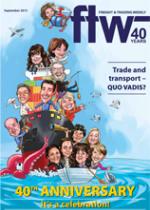In terms of the most significant
development over the past 40 years,
from a legal perspective it is hard to
choose between the containerisation
of cargo or the promulgation of the
final Constitution of the Republic of
South Africa in 1996.
Practically, containerisation
probably has been the most
significant freight development, but
the Constitution has dramatically
affected our country as a whole. The
Bill of Rights, which is enshrined
in chapter 2 of the Constitution,
enumerates the civil, political,
economic, social and cultural human
rights of the people of South Africa.
It also expressly incorporates the
Rule of Law as a fundamental
cornerstone of our democracy.
The significance of this is that
the Rule of Law and Bill of Rights,
as we have already seen, has had a
dramatic influence on procedural
fairness, the right to transparency
and reasons for administrative
action and acting as a constraint
upon behaviour of government
officials.
It has changed many aspects
of the administration of Revenue
laws. Apart from rights to access
to information in terms of section
32 and just administrative action
in terms of section 33 of the
Constitution, it has given rise to
other legislation which significantly
expands on these rights, for instance
the Promotion of Administrative
Justice Act and the Promotion of
Access to Information Act. Other
developments include the Consumer
Protection Act and the National
Credit Act.
Portions of legislation, like section
114 and recently section 4 of the
Customs and Excise Act, have been
struck out as being in conflict with
the Constitution. Most disputes are
in some way affected by the rights
enshrined under the Constitution.
Affected parties now have a right
to reasons, a right to information,
an opportunity of response prior to
demands being issued, a right to be
informed of the allegations against
them, a need for a search warrant
save for routine audits
and the like. Any
government
official’s
behaviour is
now subject
to the
constraints
of the
Constitution. The elements of
procedural fairness are reflected in
appeal procedures that have been
dramatically enhanced and the
Commissioner even now has the
right in appropriate cases to settle
matters and waive revenue.
‘Cut the red tape’
Our wish for the future is that
government and our Revenue
authorities, who after all are
constrained by policy, move towards
an easier business environment.
Successful businesses spend time
and effort in finding out what breeds
success and then adopting strategies,
engaging the right people and
developing an ethos or culture that
will ensure success. As a country,
we need to do the same thing. South
Africa needs to guard against overregulation.
It has been said that
where there are too many laws,
people lose respect for the law. It also
becomes economically stifling and
ultimately counterproductive.
Industry must engage with
government to work towards a
practical proactive approach and a
more business-friendly regulatory
environment. Ultimately if this
can be achieved the state will earn
greater revenues.
INSERT & CAPTION
South Africa needs
to guard against
over-regulation. It
has been said that
where there are
too many laws,
people lose respect
for the law.
– Quintus van
der Merwe

